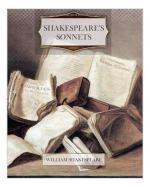Take all my loves, my love, yea take them all;
What hast thou then more than thou hadst before?
No love, my love, that thou mayst true love call;
All mine was thine, before thou hadst this more.
Then, if for my love, thou my love receivest,
I cannot blame thee, for my love thou usest;
But yet be blam’d, if thou thy self deceivest
By wilful taste of what thyself refusest.
I do forgive thy robbery, gentle thief,
Although thou steal thee all my poverty:
And yet, love knows it is a greater grief
To bear love’s wrong, than hate’s known
injury.
Lascivious grace, in whom all ill well
shows,
Kill me with spites yet we must not be
foes.
XLI
Those pretty wrongs that liberty commits,
When I am sometime absent from thy heart,
Thy beauty, and thy years full well befits,
For still temptation follows where thou art.
Gentle thou art, and therefore to be won,
Beauteous thou art, therefore to be assail’d;
And when a woman woos, what woman’s son
Will sourly leave her till he have prevail’d?
Ay me! but yet thou mightst my seat forbear,
And chide thy beauty and thy straying youth,
Who lead thee in their riot even there
Where thou art forced to break a twofold truth:—
Hers by thy beauty tempting her to thee,
Thine by thy beauty being false to me.
XLII
That thou hast her it is not all my grief,
And yet it may be said I loved her dearly;
That she hath thee is of my wailing chief,
A loss in love that touches me more nearly.
Loving offenders thus I will excuse ye:
Thou dost love her, because thou know’st I love
her;
And for my sake even so doth she abuse me,
Suffering my friend for my sake to approve her.
If I lose thee, my loss is my love’s gain,
And losing her, my friend hath found that loss;
Both find each other, and I lose both twain,
And both for my sake lay on me this cross:
But here’s the joy; my friend and
I are one;
Sweet flattery! then she loves but me
alone.
XLIII
When most I wink, then do mine eyes best see,
For all the day they view things unrespected;
But when I sleep, in dreams they look on thee,
And darkly bright, are bright in dark directed.
Then thou, whose shadow shadows doth make bright,
How would thy shadow’s form form happy show
To the clear day with thy much clearer light,
When to unseeing eyes thy shade shines so!
How would, I say, mine eyes be blessed made
By looking on thee in the living day,
When in dead night thy fair imperfect shade
Through heavy sleep on sightless eyes doth stay!
All days are nights to see till I see
thee,
And nights bright days when dreams do
show thee me.




